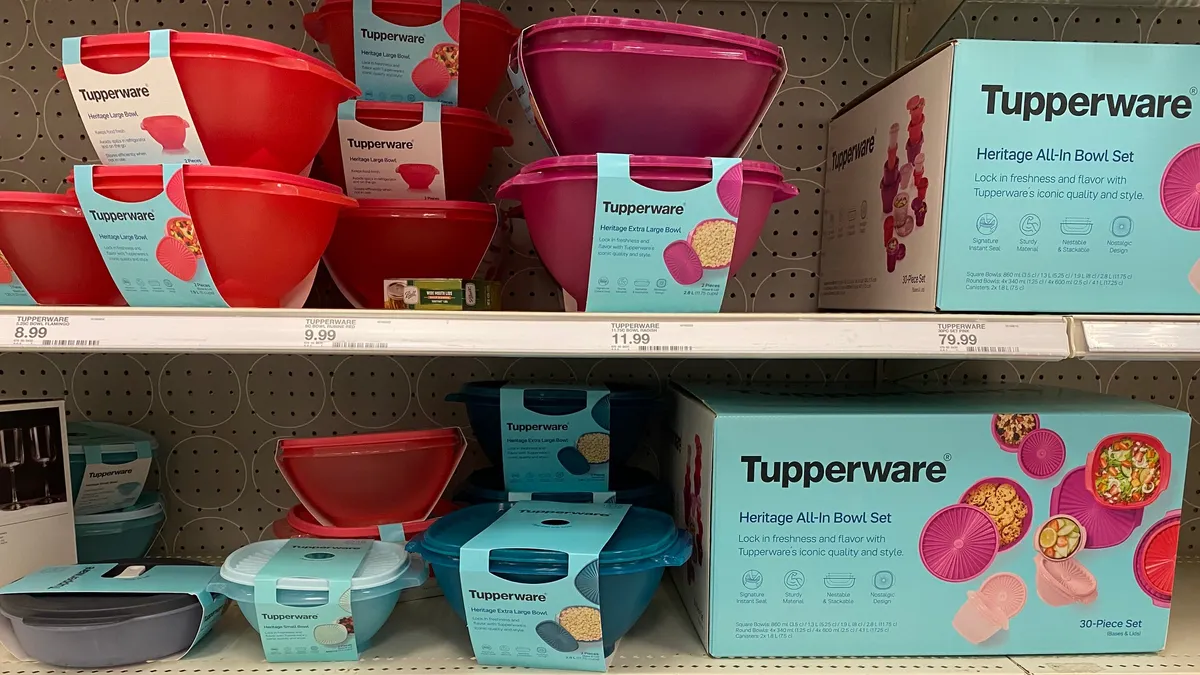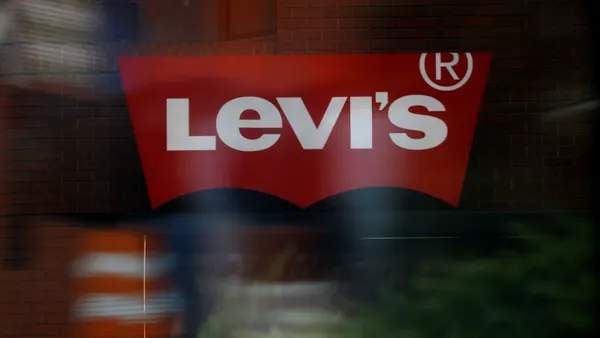Dive Brief:
-
Iconic American homeware company Tupperware, in a much-anticipated move, on Tuesday filed for Chapter 11 at the U.S. Bankruptcy Court for the District of Delaware.
-
But the company faces opposition from new lenders known as “the Ad Hoc Group.” They want to acquire its assets via a foreclosure process or Chapter 7 bankruptcy, which could entail liquidation, per court documents.
-
The brand — which rose to prominence following World War II and thrived under a direct-selling model known as Tupperware Parties — has about $811.8 million in funded debt obligations, mostly a single first lien credit facility. Otherwise, the company has an $8 million bridge loan that it entered into last month.
Dive Insight:
In a host of ways, Tupperware, founded in 1946, has been late to the party.
At first, the brand was a mega-hit. Tupper Plastics had made supplies like gas masks during World War II, but Earl Tupper knew his factories needed to shift to a post-war economy. Tupper innovated ways to turn the black, foul-smelling wartime material into clear, clean plastic and developed an air-tight seal. The Tupperware brand was found at hardware and department stores until a housewife who was selling other products from home got permission to sell the new wares.
Eventually called Tupperware Parties, this direct-selling method was lucrative for decades. The company now has a workforce of more than 5,450 people and a global salesforce of more than 465,000 sellers in almost 70 countries.
But the brand was slow to adapt to the realities of e-commerce and omnichannel retail, per court documents, and only in recent years, as part of a turnaround, began to work again with retailers. Tupperware can now be found via Amazon, Target, Macy’s, its own pop-ups and international stores, per court filings. But the company said that, while direct selling now drives just 4% of overall homeware sales, Tupperware still derives almost 90% of its revenue that way.
More, “anti-plastic sentiment” and operational inefficiencies were also factors in Tupperware’s declines, per court filings. In 2022 and 2023 the company’s revenues dropped more than 16%.
“Tupperware used to be a hotbed of innovation with problem-solving kitchen gadgets, but it has really lost its edge, and with it has lost a lot of market share and its position in the market,” GlobalData Managing Director Neil Saunders said in emailed comments. “It is very difficult to see how the brand can get back to its glory days. The battle now is to survive in some form.”
Indeed, its finances have been deteriorating for years, and its sellers have increasingly fled. The company issued a going-concern warning in April 2023 as it launched an effort to possibly sell itself and attempt a stand-alone restructuring to improve liquidity. In October the company named a new CEO and shook up its board.
By February this year, however, liquidity was once again a problem, and Tupperware told the bankruptcy court that it missed an interest payment on its term loan, triggering disclosures. The company scrambled to sell itself and did entertain some offers, including one that fell through around the Fourth of July. A bridge loan in August offered some relief as the company mulled bankruptcy.
But its new lenders remain opposed to the Chapter 11 process, telling Tupperware's board, in a letter filed with the bankruptcy court: "At this time, the Ad Hoc Group does not consent to the use of cash collateral to fund a chapter 11 process that benefits no one but the Board and the Company’s restructuring professionals,” and that its intention is to file a motion to dismiss the Chapter 11 proceeding or convert it to Chapter 7.
In court documents, Tupperware said it has yet to receive a written proposal from the ad hoc group.
For now, Tupperware said in its press release Tuesday that there are no changes to its independent sales consultant agreements. The company maintains that it has “made significant progress” in what CEO Laurie Ann Goldman called its “transformation into a digital-first, technology-led company better positioned to serve our stakeholders.”
"Whether you are a dedicated member of our Tupperware team, sell, cook with, or simply love our Tupperware products, you are a part of our Tupperware family,” Goldman also said in a statement. “We plan to continue serving our valued customers with the high-quality products they love and trust throughout this process.”















